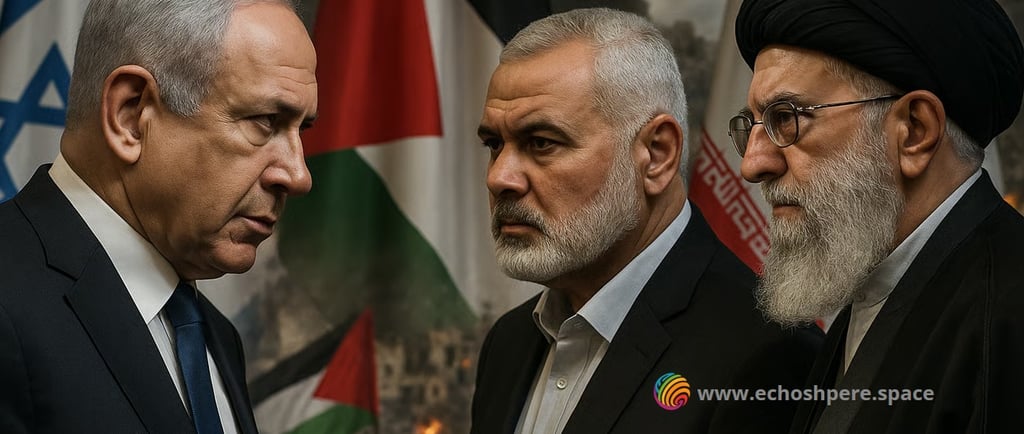My Radical Position on the Israeli and Palestinian Conflict
I had three conversations—each was radical, each was flawed—each revealed why peace between Israelis and Palestinians remains elusive. Mine isn't a neutral stance; it's a defiant one. Here's why the middle ground is revolutionary.
GENERAL TOPICSSOCIAL MEDIASOCIAL COMMENTARYCHRISTIANITYINTELLIGENCENATIONAL SECURITY


I once had a series of conversations with three different individuals about the Israeli-Palestinian conflict. Each one held views that were passionate, clear-cut, and deeply entrenched. My position differed from all three, but was harder and more radical than any one of them.
A White Liberal American Woman
The first conversation I’ll discuss here was an exchange with a white liberal American woman, an atheist, or as she clarified, "technically agnostic." She has strong anti-Christian views and remains a staunch Obama supporter. Her solution was as startling as it was absolute: relocate every Jewish person living in Israel to the United States and carve out a new state for them somewhere in American territory. Her reasoning was that the land rightfully belonged to the Palestinians and that Israel was nothing more than an illegal and brutal occupier.
I asked her if she genuinely believed Jews would be safe in America, given the long history of antisemitism, not only abroad but within the United States itself. She replied, Yes. I pressed further, asking why even American Jews, many of whom have never set foot in Israel, or might even be opposed to some Israeli government hardline policies, have been targets of hate crimes. Her answer? “Because of what their fellow Jews are doing to Palestinians.”
So, I asked, “Were Jews persecuted before 1948, before the modern State of Israel even existed?” The question hung in the air. What did I have in mind in asking her these questions: the Anti-Jewish pogroms in Russia (1881–1884, 1903–1906, and 1917–1921), Jewish ghettos in Europe (1939–1945), and the Holocaust (1933–1945), which all happened when Jews were stateless and powerless. She quickly changed the subject.
A White Evangelical Christian American Man
Then there was the second person: a white Evangelical Christian American man, who lived not too far from me. A staunch Trump supporter, his solution was the mirror image of the first, just inverted. He suggested moving all the Arabs living in Palestinian territories (including the West Bank, East Jerusalem, and Gaza) to “other Arab countries” like Saudi Arabia, Jordan, Syria, and even Iran. “The land belongs to the Jews,” he insisted, citing the Bible as well as historical claims.
I asked him, “Do you think the Arab world is simply a big empty house where anyone with Arab ancestry can just walk in and find a place to live?” He shrugged, “They are their brothers.” I asked, “What happens to the lives they've built over generations in Jerusalem, in Hebron, in Nablus? Their homes, schools, farms?” He said they would be compensated. I asked him if he would accept being paid to leave the house his family had lived in for 70 years, so someone else, who claims it has always been theirs, could move in. He didn’t answer that directly—just repeated that it was "God’s promise," reminding me that I was a Christian who was supposed to read the Bible.
A Non-religious Black American Man
Finally, I spoke to a third person, a non-religious Black American man who also lived nearby. He last voted in 2008, when Obama first ran for president. He voted for Obama then, but has not voted since. His view was more negative—almost like he didn’t believe anything really mattered anymore. He said—using powerful and foul language I won’t repeat—that he didn’t care what happened to either side. “Both them m…f…kers are damn racists … worse than KKK,” he said. He explained that both Israelis and Arabs were anti-Black, and that both deserved whatever destruction they brought on themselves.
That conversation struck me more than the others. Because buried beneath the bitterness was a deep weariness, a sense that the world only pays attention to some struggles, some lives, some traumas. In contrast, others, like those of Black people in America and elsewhere, are dismissed or forgotten. Still, it was a surrender to despair, and despair does not build peace.
A Rude Re-Awakening (Somewhat)
After those conversations, it became painfully clear to me that we are a society addicted to moral absolutism. We don’t just pick sides; we become fused with them. We don't just support a cause; we vilify those who challenge our version of it. Very few people want to look at both the Israeli and the Palestinian stories. Fewer still can hold space for the humanity, the history, and the suffering of both peoples at once.
Each of the views I heard was, in its own way, an ideological escape hatch—a way to simplify a brutal, tangled conflict by eliminating one side or the other.
Yes, for my black brother, I know his pain—the anti-Black racism of the Israelis and Arab countries is without question. Was it not Benjamin Netanyahu who called Sub-Saharan African migrants a cancer in the Israeli society and apologized to cancer patients for comparing their ailments with the undesirable invaders? Was I not dismayed when I read Israeli health workers secretly disposing of blood donated by Black Jews during national blood drives?
Am I not aware that among Palestinians, the Afro-Palestinians and Black refugee minority face systemic racism, social exclusion, and limited marriage prospects, particularly in Jerusalem and refugee camps, despite sharing national and religious Palestinian identity? Have I forgotten the brutal treatment of Black people in Libya after Gaddafi was overthrown? Do I not know that Arab countries like Jordan and Saudi Arabia rank at the top in being the most racist places on earth—far worse than the US, the entire Europe, and Israel? Of course, I know all that.
And yet, peace never comes by erasure or by allowing those who despise you to kill themselves.
I’ve learned that my own centrist stance is unpopular on all fronts. When I say that the Palestinians deserve dignity, self-determination, and freedom, I'm accused of enabling terrorism. When I say that Israel has a right to exist, defend itself, and protect its citizens, I’m charged with excusing Zionism and colonialism. There is little room left in the middle—little tolerance for the belief that both peoples have been wounded by history, and both deserve a future. To the Black man, I have directly experienced his pain.
But maybe that’s precisely why I stay in the middle: because someone has to.
To stand in the middle is not to stand still—it is to stand alone, absorbing the fire from both sides, refusing to give up on either’s humanity. It is to be unafraid to challenge extremes on both sides. That’s not fence-sitting—it’s a rare and risky position that demands intellectual honesty.
Someone has to resist the seduction of simple answers based on a burning love or hate of one side: love or hate that blinds. Someone has to believe that the path to peace isn't found in a bulldozer or a border fence or a missile or a relocation plan, but in something far more radical: mutual recognition, uncomfortable listening, and shared humanity.
So, I keep asking hard questions—not because I have all the answers, but because I know how dangerous it is when everyone believes they do. My centrist stance is not easy. It’s radical, and I know that only a few people can stand there in our highly polarized world, where it's either this or that.
COMMENTS: Comments are disabled for this post.



